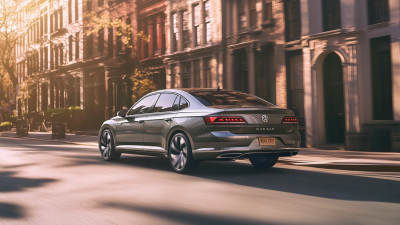Leave Your Message
Choosing the right car make for your lifestyle and budget can be a daunting task, especially with the vast array of options available on the market today. Each car make offers unique features, performance capabilities, and price points that cater to different needs and preferences. Whether you're a city dweller seeking a compact vehicle that excels in fuel efficiency or an outdoor enthusiast in need of a rugged SUV, understanding the nuances of various car makes is essential. This blog aims to guide you through the selection process by highlighting the best car makes suited for diverse lifestyles and financial considerations. We will explore what factors to consider, such as reliability, resale value, and maintenance costs, helping you make an informed decision that aligns perfectly with your individual requirements and budget.

When it comes to selecting the right car, understanding your lifestyle needs is crucial. Begin by assessing your daily activities and routines. For instance, if you have a family or regularly transport multiple passengers, a spacious SUV or minivan could be the ideal choice. On the other hand, if you're a city dweller who navigates tight streets and values fuel efficiency, a compact car or hybrid might better suit your needs.
Beyond passenger capacity, consider your hobbies and lifestyle activities. For those who enjoy outdoor adventures or require cargo space for sporting equipment, an all-terrain vehicle with ample storage might be perfect. Additionally, evaluate your commuting distance and frequency—if you drive long distances daily, a car with excellent fuel economy and comfort features is essential. By aligning your vehicle choice with personal needs, you can enhance not only your driving experience but also your overall lifestyle.
| Car Type | Lifestyle Suitability | Average Price Range | Fuel Efficiency (mpg) |
|---|---|---|---|
| Sedan | Daily Commuting | $20,000 - $30,000 | 25-35 |
| SUV | Family Road Trips | $30,000 - $50,000 | 20-28 |
| Truck | Work and Utility | $25,000 - $60,000 | 15-25 |
| Hatchback | Urban Driving | $15,000 - $25,000 | 30-40 |
| Convertible | Leisure / Weekend | $28,000 - $60,000 | 20-30 |
When considering a new vehicle, it's essential to evaluate your budget beyond just the sticker price. Many buyers focus solely on the upfront cost of a car, but there are several additional expenses that can significantly affect your overall financial commitment. Insurance premiums, for example, can vary widely depending on the make and model you choose. Luxury vehicles often carry higher insurance rates due to their repair costs and theft rates, while more practical options may help you save on this front.
Moreover, maintenance and fuel costs should be integral parts of your budgeting process. Some cars, especially those with high-performance engines or complex technology, can incur substantial maintenance fees over time. Additionally, fuel efficiency plays a crucial role; choosing a vehicle with excellent mileage can lead to long-term savings at the pump. It's also wise to consider potential resale value, as some brands and models depreciate less than others. By taking these factors into account, you can make a more informed decision that aligns with both your lifestyle needs and financial goals.
When choosing the right car make for your lifestyle and budget, it's essential to consider the suitability of various car types for your specific activities. For instance, if you are actively involved in outdoor sports or have a large family, SUVs or crossovers can offer the space and versatility needed. According to recent market insights, SUV sales accounted for approximately 45% of the automotive market, indicating a growing preference for vehicles that provide both utility and comfort.
On the other hand, if you have a commuter-centric lifestyle, compact cars may suit you better. These vehicles typically boast higher fuel efficiency, and data shows that compact cars can achieve up to 40 miles per gallon, making them an economical choice amidst rising fuel prices. The popularity of electric vehicles is also on the rise, with a significant increase in consumers seeking eco-friendly options. Reports indicate that sales of electric vehicles have surged by over 50% year-over-year, reflecting a shift towards greener alternatives in personal transportation.
In metropolitan areas, where parking and maneuverability are crucial, smaller hatchbacks or sedans may better fit your daily needs. With various government incentives supporting the purchase of new vehicles, including trade-in programs for eligible buyers, now is a great time to explore options that not only align with your budget but also enhance your lifestyle.

When selecting a car, understanding the reputation of various brands is essential. Established manufacturers often have a long track record of producing reliable vehicles. Researching consumer reviews and industry ratings can provide insight into how different brands are perceived regarding quality and dependability.
 Popular brands typically offer extensive warranties and solid customer service, further reinforcing their reliability and enhancing buyer confidence. Additionally, consider looking into recalls or common issues associated with specific makes as this information can significantly influence your choice.
Popular brands typically offer extensive warranties and solid customer service, further reinforcing their reliability and enhancing buyer confidence. Additionally, consider looking into recalls or common issues associated with specific makes as this information can significantly influence your choice.
Resale value is another critical factor when evaluating car brands. Some brands maintain their value better than others, which can be important if you plan to sell or trade in your vehicle in the future. Luxury brands, while often more expensive initially, may depreciate faster than mainstream ones due to high running costs and lower demand in the resale market.
Conversely, brands known for their reliability, such as Toyota and Honda, typically experience slower depreciation, making them smart financial choices if you are budget-conscious. By carefully researching and considering these aspects, you can make a more informed decision that aligns with both your lifestyle and financial goals.
When choosing the right car make for your lifestyle and budget, it's crucial to think ahead and consider how your life may evolve. Future-proofing your decision means assessing your current and anticipated needs.
For instance, if you're single now but plan to start a family, you might want to invest in a spacious vehicle with safety features and ample cargo space. Similarly, if you foresee a shift in your commute or moving to a different climate, these factors should influence your choice of car.
Moreover, consider long-term costs such as insurance, maintenance, and fuel efficiency. A compact hybrid may suit your budget today, but if your lifestyle changes to require more space for gear or passengers, a larger SUV or crossover might become necessary.
By envisioning the trajectory of your life and aligning it with your car purchase, you're more likely to make a wise investment that serves you well into the future, making it easy to adapt when new needs arise.






